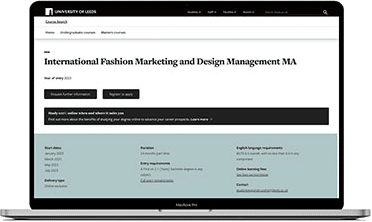Meet the Programme Lead for International Fashion Marketing and Design Management
International Fashion Marketing
Dr Rubab Ashiq is the Programme Lead for the online International Fashion Marketing and Design Management Masters programme delivered by the University of Leeds. She specialises in fashion management, marketing, and branding communications. Dr Ashiq is passionate about nurturing fashion leaders and equipping them with the skills they need to excel in the industry.
In this Q&A, we delve into Dr Rubab Ashiq’s inspiring career, and the journey that led her to a prominent role at the prestigious Leeds School of Design.
Learn more about our International Fashion Marketing and Design Management coursePlease could you begin by introducing yourself?
I’m Dr Rubab Ashiq, and I work as a lecturer in fashion marketing at the School of Design at the University of Leeds. I completed my PhD in Fashion Marketing and earned a Masters in Fashion Management with Marketing. My academic journey started with a Bachelor’s degree in fashion design, which provided me with a solid foundation for my multifaceted expertise in fashion.
Could you tell us a little bit more about your experience and how you got to where you are today?
My journey began on the day I enrolled in a Bachelor’s programme in Fashion Design. It marked the starting point of my pursuit of a lifelong passion. The cherished childhood memories, adorned with vibrant colours and intricate textures, continued to serve as my guiding light. As I delved deeper into fashion design, I realised that while the creative aspect of fashion was undeniably inspiring, I also yearned to explore other facets of this dynamic field. That’s when I decided to pursue a Masters in fashion management and marketing.
After completing my Masters degree, I returned to my homeland Pakistan, eager to gain practical experience in the fashion industry. I had the privilege of working alongside a renowned couturier and in a textile mill. During this period, I discovered that my passion for learning about fashion was insatiable. This realisation led me to pursue a Ph.D. During my first year as a PhD student, I also ventured into teaching, taking on the role of an associate lecturer in fashion management and marketing at the same university. Here, I uncovered a new passion for teaching. This revelation opened a world of possibilities for me, and it became clear that sharing my knowledge and enthusiasm with the next generation of fashion enthusiasts was my true calling.
In a nutshell, my journey in the world of fashion has been one of exploration, discovery, and growth. I am grateful for the opportunities I have had and look forward to continuing to explore the many facets of fashion and positively impacting the industry. I hope my journey inspires students from diverse backgrounds who may be on a similar path of exploration and discovery.
Why the fashion industry? Where does your passion for the subject stem from?
My fascination with the fashion world goes back as far as I can remember. Growing up in Pakistan, the rich tapestry of our culture enchanted me, and fashion was an integral part of it. I vividly recall watching my mother and elder sister dress in splendid traditional outfits. The vibrant colours, the intricate textures, embroideries, and the sheer artistry of South Asian fashion never failed to captivate me. It was in those moments that I realised my deep-seated passion for all things fashion.
What would you say your main area of expertise in fashion is? Do you have any research interests?
My main areas of expertise in fashion are fashion management and marketing. As an early career academic, I bring a fresh perspective and enthusiasm to my research, intending to contribute to knowledge and practice in these fields. My current research primarily focuses on the convergence of fashion, e-commerce, and social media technologies. I am also keenly interested in exploring the distinct characteristics, challenges, and opportunities faced by small and medium enterprises (SMEs) and micro and social enterprises within the fashion and textile industry, both in developed and developing countries.
Could you tell us a little bit more about the International Fashion Marketing and Design Management course? What does it involve and who’s it for?
The course has been designed and developed for people who are interested in the areas of fashion marketing and design management but who are unable to study full-time on campus. Working professionals are finding it more difficult to take study leave, so it’s for people who may be working in the fashion industry in some part of that fashion value chain, or they may be interested in moving from the field that they’re currently working in, into the fashion industry because that’s their passion.
The course is really designed for people who are in employment, or have considerable care responsibilities for a partner, child, or parent, and want to study via a flexible online learning method.
What are you hoping students will get out of the course?
I’m hoping that students will get a broader picture of how the fashion industry operates now compared to the past. Sustainability and the impact of textiles on fashion, the environment and society are also important topics to consider. I think that the course is designed to both highlight those challenges, but also to create space for students to come up with propositions and ideas for how businesses can change to improve situations such as the carbon footprint of fashion logistics.
So, in terms of the fashion industry, a lot of components are moved around the world until they get to the end consumer. All of this has considerable impact on the carbon footprint of each garment and there are all sorts of ways that can be considered to shift that: onshoring as one of them or near shoring. Companies like Burberry have restructured their business and are now onshoring here in the UK. And although that means that there’s still garments that are being exported and shipped around the world, much more of the core sales are occurring closer to the point of manufacturing. So, those kinds of challenges are the type that I see students having the opportunity to develop both their knowledge of and their experience in working through ideas to change that situation for these fashion brands and businesses.
Why did you choose to join the University of Leeds?
I joined the University of Leeds because of its renowned research excellence, global reputation, and expanding range of fashion design and marketing programmes. The University’s commitment to pushing the boundaries of knowledge aligns perfectly with my research-oriented career aspirations in fashion management and marketing. Its international standing and high rankings in education made it an attractive choice, and the University’s dedication to continually evolving its fashion programmes reflects the dynamic nature of the fashion industry, providing an ideal environment for my academic pursuits.
What’s it like being a part of the Leeds School of Design, and could you tell us a little bit more about its reputation and the ranking?
The University itself is very highly ranked, both nationally and internationally. We have an excellent mentoring scheme where more experienced researchers will mentor new academics.
Being a part of the Leeds School of Design is a fulfilling experience within the esteemed University of Leeds, ranked 75th globally in the QS World University Rankings in 2023. Our researchers in the School of Design collaborate closely with industry partners to ensure our work has a tangible impact on society and culture. We have an excellent mentoring scheme where more experienced researchers will mentor new academics. As a testament to our commitment to excellence, the School of Design is also ranked among the World’s Top 50 Universities for Arts and Humanities in the QS World Rankings for 2023, solidifying our reputation as a leading institution in the field of design.
What have some of the previous graduates of the School of Design gone on to?
It’s very varied and students have gone into a range of fashion careers. One of our graduates worked with Burberry in a customer relations function. Others are working for the Fendi Group in China, but we’ve also had students set up their own businesses and enjoy success there.
We’ve had students who were very passionate about areas like sustainability, working with organisations like Stella McCartney where sustainability has been a core part of their ethos since the inception of the company. We’ve had several people work for Boohoo. It’s impressive that within three months of graduating, a very high percentage of our students are in full-time employment.

Did you enjoy this blog? Here’s some related fashion management content that you may be interested in:

Want to learn more about our online International Fashion Marketing and Design Management course?
Check out the course content and how to apply.

